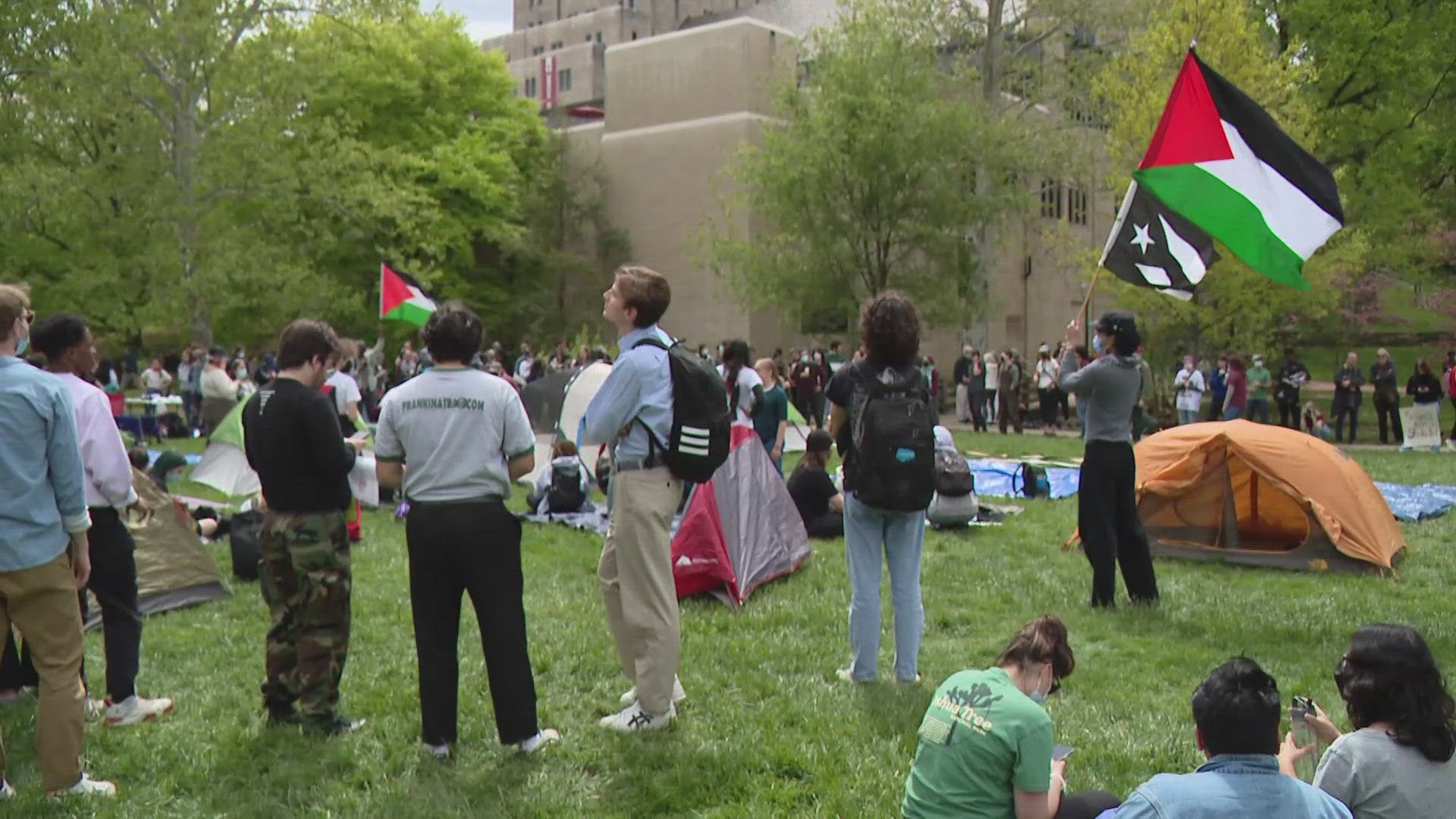BLOOMINGTON, Ind. — For the second day in a row, protestors, many of them students, along with some faculty, gathered at Indiana University to protest the Israel-Hamas war.
Thursday, police arrested 33 protestors who the university says ignored orders to take down tents they had put up on Dunn Meadow, the area of campus where students are allowed to hold protests and demonstrations.
According to university policy, temporary structures, like tents, are only allowed on Dunn Meadow with pre-approval, a policy change the university told faculty in a statement Thursday night they had made earlier in the week.
The original policy called for tents to be removed by 11 p.m. to prevent camping out overnight on campus grounds.
According to the statement to faculty, the university's administration felt the change was necessary after learning protestors planned to camp out at Dunn Meadow indefinitely.
In a statement the university put out Thursday, they said Indiana University police and the Indiana State Police asked students several times both in the morning and afternoon to take down the tents, and when they didn't comply, those protestors were asked to leave Dunn Meadow.
When that didn't happen, the university said police dispersed, detained, and removed some of the protestors.
"I watched the police violence towards a lot of people. It was very scary," said IU student Margaret Carpenter, who came to Dunn Meadow Friday, she said, to show her support for what she called "A Free Palestine."
"It was a completely absurd reaction to a very peaceful protest," Carpenter added.


Friday, the Monroe County Prosecutor's Office said all 33 people arrested for trespassing on Thursday had been released, with court hearings set for June.
The prosecutor's office said video from Thursday would be reviewed before deciding on what, if any. charges should be filed.
Those students and faculty arrested also faced a one-year ban from setting foot on campus.
"IU allowed and encouraged armed violence against students of the crime of having a tent in a park," protestor Bryce Greene said. "How much money did that cost? How much time did that cost? How many students' lives are now damaged because of this? Was it worth it?"
In a statement Friday, an IU spokesperson encouraged students who had been arrested and banned from campus to appeal that ban.
According to the statement, in most cases, a ban would be suspended during the appeals process so students and faculty could finish out the year.
Friday morning, some tents were back up, with no observable police response to them.
Several hundred protestors were back, too, at Dunn Meadow, with the same set of demands they had the day before.
RELATED: 14 Gaza war protesters arrested after blocking traffic along Meridian Street on Indy's north side
Protestors called on the university to cut ties with any companies or lobbying groups that support the Israeli government, which they said has committed genocide against thousands of innocent Palestinian civilians since the Israel-Hamas war began.
"The most important thing is to stop that right now, which a large part of that comes from stopping sending weapons and money to them," said Dylan Charter.
Protestors have also called on Indiana University President Pam Whitten and two other administrators to step down.
"She's been particularly repressive; all of these people have against support of Palestinian rights," Greene said.
As proof of such an allegation, Greene pointed to the suspension of a tenured IU professor earlier this year, who advised the student Palestinian Solidarity Committee, along with the cancellation of an art exhibit featuring an artist who expressed pro-Palestinian views on social media.
IU put out a previous statement regarding that professor's suspension.
"It is the university's practice not to comment on individual personnel matters. However, in determining common sanctions, it is uniform practice for the chief academic affairs officer to consider the facts of a given case, in addition to prior or repeat patterns of behavior or misconduct."
RELATED: As some universities negotiate with pro-Palestinian protesters, others quickly call the police
According to the Indiana Daily Student, the university's campus newspaper, the university said the art exhibit was cancelled because of security concerns.
In a statement to faculty Thursday, Whitten said the decision to change the university's policy on tents came as they watched similar events unfold across the country.
The statement said safety was at the foundation of the decision and that IU must create a space for meaningful dialogue, peaceful protest and the free expression of ideas.
Protestors gathered Friday said such sentiment flies in the face of what happened Thursday.
"The president of the university should be out here celebrating free speech, not calling on the military and state troopers who are armed to the gills with snipers on the roof," said retired IU anthropology professor Susan Seizer.
An Indiana State Police spokesperson said IU's police department asked state police to come to IU, but would not confirm if they had snipers on rooftops, only that they had personnel observing from above, including a state police helicopter.
"The snipers, the choppers, the assault rifles, the shotguns, all of them, designed to intimidate students," said Greene.
Protestors gave no indication on whether they planned to stay beyond 11 p.m., the time, according to university policy, Dunn Meadow must be cleared.

